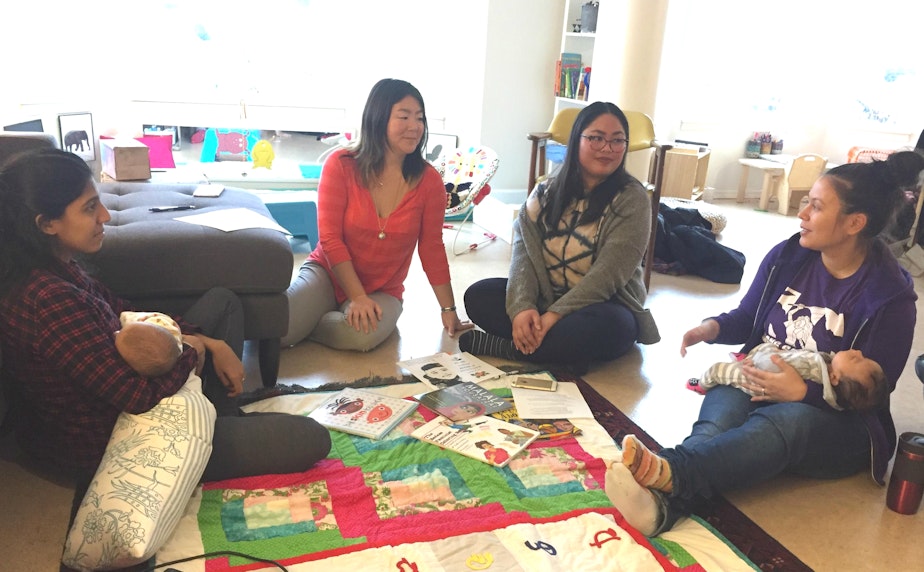For parents raising infants of color, this support group aims to uplift

Support groups for new parents are popular in Seattle. Parents swap tips about when to introduce the bottle and empathize about new family dynamics.
But the mothers gathered in this light-filled Beacon Hill living room have a different mission: discussing how they want to raise their infants of color.
"When we talk about race within our groups, we really center people’s identities on who we come from, where we come from, our ancestry, and also in the context and construct of what race is in the United States," facilitator Selena Velasco told the group.
She's the program director for Families of Color Seattle, a nonprofit that brings families together to celebrate the beauty – and challenges – of bringing up kids of color in predominantly white city and in a society where white privilege is systemic.
Carly Feria is holding her 6-week-old daughter, Ka’Zuri, who’s part-Filipina, part-black. "With this political climate, there's a lot of unknowns, and bringing a young brown person into this world is a little scary. But also there's the promise of what change can she make."
Sponsored
Enoka Herat nods. Her 12-week-old son, Ozan, is Sri Lankan and Turkish.
"My parents were immigrants when they came here, and I think a lot of the ways that they survived racism was to just keep their heads down and keep working. I feel like those were the messages that I learned from," said Herat.
"I want my kids to be loud, and take up space, and I want us to show our Buddhism, and our Sri Lankan-ness as much as possible. And I'm not back to work for a month, but I was, like, 'When I go back to work I'm going to start wearing my kurtas'" — tunics — "in a way that I haven't in years."
The moms discuss the tension between wanting their kids to be proud and outspoken about their race and ethnicity, as well as circumspect in certain scenarios. Families of Color Seattle Executive Director Amy Pak has 5-year-old and 7-year-old sons who are part-Korean, part-Japanese. She says a friend of her older son recently mentioned that he takes tae kwon do lessons. "And I said, 'Oh, is your master Korean?' And he said, 'No, he’s white. Of course he's white.'"
Pak says she pointed out to the boy that since tae kwon do is from Korea, masters are actually often Korean. "And right away, my son said to him, 'That's racist.' Right away I was kinda worried - if Jahyoo’s in white spaces, and he’s saying this to white kids who don't really know what whiteness is, or are they taught that?" Pak said.
Sponsored
"And kind of worrying, like, 'Jahyoo, I don't necessary want you to call out racism when you're the only kid of color.' But I was so proud of him to be able to identify that was an assumption where whiteness was the norm, and Jahyoo could see that."
Pak originally founded Families of Color Seattle eight years ago as a potluck for families around the city. It now offers a wide range of programs, including hip-hop dance classes for kids, groups for transracial adoptive parents, and black moms' groups. Hundreds of families take part in its programs and events.
"The amazing affinity people have to connect with other families of color has been really fascinating, and such an honor to support other families connecting to each other. And it’s growing, it’s really becoming the Northwest – from Snohomish to Tacoma to the Eastside," Pak said.
Carly Feria says she found a lot of groups around Seattle she could do with her baby, but none that dealt with the experience of raising a child of color.
"If you look on their web sites it's predominantly white children and their families," Feria said. "Even acknowledging that the experience is different, I think, is huge with this group.”

